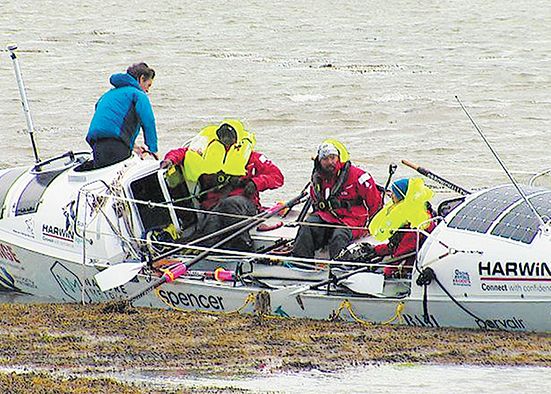Newcastle RNLI come to rescue of rowers travelling around UK
Newcastle RNLI come to rescue of rowers travelling around UK
29 June 2022

NEWCASTLE RNLI crew members were at the centre of a major rescue mission on Sunday morning to assist a team of rowers attempting to circumnavigate Great Britain.
The local crew helped rescue five rowers who were in one of three vessels taking part in the event when they encountered challenging conditions in the Irish Sea.
The rowers got into difficulty 23 nautical miles north east of Ardglass when the alarm was raised to assist the crew from the GB Row Challenge that had left London’s Tower Bridge London on June 12 to collect environmental data.
The vessel had been monitored throughout the night by HM Coastguard with frequent radio transmissions and during a 7am check on Sunday, the rowers explained they had capsized and righted themselves, but were unable to row.
Newcastle RNLI was requested to launch its all-weather lifeboat at 7.15am with weather conditions at the time described as “poor”, with a Force 7 southerly wind and very rough seas.
The lifeboat was launched under Gerry McConkey with crew members Shane Rice, Lochlainn Leneghan, Declan McClelland, Karl Brannigan and Declan Barry onboard. Conditions deteriorated following the launch, with weather increasing to a Force 9 southerly wind and high seas.
The volunteer crew arrived to help the rowers shortly before 9.30am when they assessed the situation and decided a tow was necessary to bring the vessel’s crew to safety.
However, so poor were the conditions that it took three attempts before a tow was successfully established, with the RNLI crew towing the vessel to safety at Ardglass. The journey took two hours.
The rowers were met by Newcastle Coastguard, with one checked over by the Northern Ireland Ambulance Service. None required hospital treatment.
Jason McKinlay of the Team Sea Legs crew, whose vessel was towed into Ardglass, described the conditions as “genuinely dangerous”.
He said: “In all honesty, we may be smiling and grinning and bearing it, that’s because we are safe and on land now, but obviously you think of the kids when you go and take on these challenges.”
Speaking to BBC News NI, the rower, whose children are aged nine and 12, said it was “genuinely dangerous out there once we were underwater” and that it was only because the boat was efficient in self-righting that “we are all safe and sound”.
Another crew member, Emma Wolstenholme, explained they had been battling for the last three days with “increasingly strong winds”.
She continued: “We knew that it was going to be 30 knots of wind, it just increased to 40, which meant bigger waves, really steep, and we were just battling with the elements and trying to keep the boat upright.
“We did have one full capsize. As soon as we capsized and we got onboard, I spoke to Sophie who was on the cabin and said ‘please get on the radio, talk to the Coastguard tell them what has happened’.
“It was just giving them a heads up, in the end they overrode our decision to continue and they sent out a boat to tow us in.”
Ms Wolstenholme said they would monitor the weather, and liaise with GB Row Challenge, but that the team were “still of that mindset” to continue in the event if possible, adding: “We want to get to the finish line.”
Newcastle RNLI coxswain, Gerry McConkey, wished the rowers well following their experience on Sunday after they got caught by the poor weather.
He also commended the volunteer crew who used their skills and training to work in “extremely challenging conditions that deteriorated during the call out to successfully bring the five people to safety.”
The vessel towed to safety in Ardglass was one of three that had hoped to to collect environmental data, but each ran into trouble separately and had to be rescued. The first vessel was rescued after it lost communication with its shore contact on Friday.
Its last known location was 42.5 nautical miles west of St Ann’s Head, Pembrokeshire. It was subsequently found by a ferry and e towed to Milford Haven.
The second vessel called for assistance came on Saturday after a crew ran into difficulty with gale force eight winds and rough seas about 18 nautical miles north-east of Larne, Co Antrim. They were able to board an RNLI lifeboat and were brought back to shore.
The third vessel was the one that capsized 23 nautical miles north-east of Ardglass, Co Down, on Sunday morning. Although they were able to right themselves, they were unable to row and were rescued and towed to Ardglass.
Alex Smith, commander at HM Coastguard, said that even though the rowers were well prepared “they still got caught out”.
He added: “The rowers were well prepared, they had all the appropriate safety equipment, a VHF radio and satellite phone, but they still got caught out. Most importantly, they had a shore contact, who was able to raise the alarm after communications were lost with the first vessel.”
“Whether you are rowing across the sea, sailing along the coast or going out for a paddle, always be prepared, check the weather, take the appropriate safety equipment and means of calling for help.”


